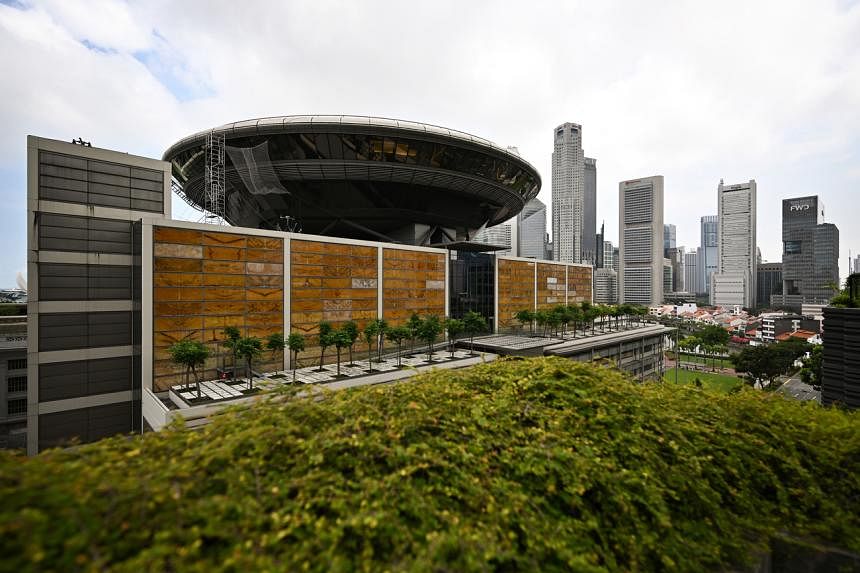SINGAPORE - Two men who were initially convicted of drug trafficking - one of whom was sentenced to the death penalty - were acquitted by the Court of Appeal on Friday (May 27).
The three-judge court, led by Chief Justice Sundaresh Menon, allowed the appeal of Raj Kumar Aiyachami, 40, against his conviction and mandatory death sentence.
The court also allowed the appeal of Ramadass Punnusamy, 41, against his conviction and sentence of life imprisonment and 15 strokes of the cane.
The appeals of both men turned solely on whether each of them knew about the nature of the drugs.
The pair had been charged over a bag of drugs containing not less than 1.875kg of cannabis.
On Sept 21, 2015, Ramadass, a Malaysian, drove a lorry into Singapore.
Central Narcotics Bureau officers then observed Ramadass delivering the bag to Raj, a Singaporean, in Senoko.
Raj, who was represented by Mr Ramesh Tiwary, did not dispute the drugs were in his possession but contended that there had been a mistaken delivery.
He said he had ordered tobacco laced with a synthetic chemical that mimicked the narcotic effects of cannabis, known as Butterfly, and had gone to pick it up but received a bag of cannabis instead.
Ramadass, who was represented by Mr Eugene Thuraisingam, did not dispute he had delivered the bag to Raj but contended that he did not know the nature of the drugs.
He said he had been told by someone called Muruga that four bags of chemically sprayed tobacco had been placed in the lorry.
He added that he had delivered three bags to others before making the delivery to Raj.
Ramadass contested three statements he had given that appeared to suggest he had knowledge of the nature of the drugs.
The pair were convicted by the High Court in June 2020.
The trial judge, Justice Chua Lee Ming, rejected the evidence of two inmates Raj had called to testify on his behalf.
One inmate, Mark Kalaivanan Tamilarasan, said he had gone to Senoko that same day to pick up cannabis and chewable tobacco but had instead received Butterfly.
Mark said he was sure of the date, which he had tattooed on his finger as his pet hamster died that day.
The other inmate said he used to buy Butterfly from Raj.
Justice Chua also rejected Ramadass’ evidence and said that he had ample opportunity to tailor his evidence to fit Raj’s defence.
The judge did not believe Ramadass would have accepted what Muruga had told him.
Raj was given the mandatory death sentence.
Ramadass was sentenced to a life term and the mandatory minimum of 15 strokes of the cane as he was found to be a courier and was issued a certificate of substantive assistance by the prosecution.
On Friday, the Court of Appeal allowed their appeals and overturned their convictions.
The apex court said Raj had succeeded in establishing his defence of mistaken delivery, which was supported by the evidence of other witnesses.
“In our judgment, the fact that Mark had effectively confessed to having at least attempted to commit a serious offence is a weighty factor in evaluating his evidence,” said the court.
The apex court added that the trial judge erred in rejecting Mark’s evidence on the basis that he and Raj “had more than ample opportunity to collude and manufacture the story”.
The court also concluded that the contested statements could not be relied upon to show that Ramadass had actual knowledge that he was delivering cannabis.
Among other things, there were doubts as to the actual words that Ramadass had used to describe the drugs.
Mr Tiwary told The Straits Times on Friday afternoon that Raj had been released from prison.
Mr Thuraisingam said a temporary pass for Ramadass will likely have to be arranged by the Immigration and Checkpoints Authority as his entry pass had expired.
Ramadass will then have to leave Singapore before his temporary pass expires, he said.
Recent cases where accused have walked free
September 2020
Nigerian Ilechukwu Uchechukwu Chukwudi was cleared of a capital drug trafficking charge.
In a four-one split decision, the Court of Appeal reversed its 2015 decision to convict him.
The majority ruled that its past verdict can no longer stand after new evidence surfaced that Mr Ilechukwu was suffering from post-traumatic stress symptoms when he lied to narcotics officers in 2011.
Mr Ilechukwu was arrested in 2011 after nearly 2kg of methamphetamine was found in his suitcase.
October 2020
Malaysian Beh Chew Boo was cleared of a capital charge for importing 499.97g of methamphetamine after the Court of Appeal overturned his conviction.
Mr Beh was arrested in 2016 riding into Singapore on a motorcycle, which contained a bag of different drugs.
The apex court accepted that he was not aware of the drugs, noting that the bike was borrowed and the DNA found on the bundles was not his.
He was freed in March 2021 after the court dismissed a bid by prosecutors to revive other non-capital charges.
May 2021
Malaysian bus driver Mangalagiri Dhruva Kumar was acquitted by the High Court of trafficking not less than 22.73g of heroin.
Mr Mangalagiri was identified by a drug suspect as the person who handed her two packets of drugs.
The judge said the the suspect’s evidence was not reliable.
The acquittal was upheld on appeal.


